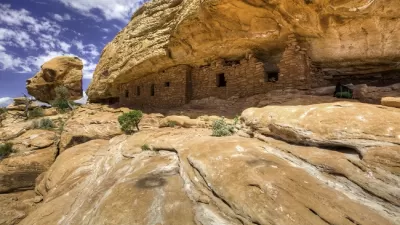A dramatic entrance on horseback preceded one of Ryan Zinke's first actions as Secretary of the Department of Interior—rescinding guidance issued by the Fish & Wildlife Service to phase out the use of toxic, lead ammunition on federal lands.

For the equestrians who follow Planetizen, as reported by Juliet Eilperin for The Washington Post:
Zinke — who was confirmed by the Senate on Wednesday [March 1] by a 68-to-31 vote — rode with a nine-person mounted police escort to the Interior Department’s downtown headquarters on Tonto, an Irish sport horse [on Thursday]. The horse, a bay roan gelding standing just over 17 hands tall, is normally kept in stables on the Mall and is owned by the U.S. Park Police.
After settling into his new office, the former Republican congressman from Montana signed two orders which his department's media office lumped, some might say questionably, as "Orders to Expand Access to Public Lands."
Perhaps the rationale for calling Secretarial Order No. 3346 (pdf), the order which rescinds the Jan. 20, 2017 lead ammunition ban on federal lands, as "expanding access" is that "[s]everal gun rights and hunting groups had objected to the policy...on the grounds that non-toxic copper and steel shot is somewhat more expensive," reports Eilperin.
Stephen Gutowski of the Washington Free Beacon quoted now-former U.S. Fish and Wildlife Service Director Dan Ashe, an Obama appointee, to explain the rationale behind the the Jan. 20 ban, President Obama's last day in office:
"Exposure to lead ammunition and fishing tackle has resulted in harmful effects to fish and wildlife species," Ashe said in his order [no longer on the agency's website]. "According to the U.S. Geological Survey, lead poisoning is a toxicosis caused by the absorption of hazardous levels of lead in body tissues."
"Ingested lead pellets from shotgun shells have been a common source of lead poisoning in birds," the order continued. "The Service recognized the problem of avian exposure to lead shot used for waterfowl hunting and enacted restrictions in 1991 and hunting and waterfowl populations have thrived since."
Eilperin reports that advocates of the lead ban claim that is lead poisoning from ammunition is "estimated to kill between 10 and 20 million birds each year, along with other species."
While the older restrictions that pertain to waterfowl hunting will presumably remain, it's the expansion enacted on Jan. 20 that was rescinded on March 2 by the first of the two orders that Secretary Zinke signed. The second order, Secretarial Order No. 3347 (pdf), does, in fact, expand access "by directing bureaus and agencies to immediately identify areas where recreation and fishing can be expanded," according to the press release.
Eilperin also reports on an issue covered recently in Planetizen: the transfer of federal lands to states and municipalities.
Zinke made it clear in his note that he was adamantly opposed to selling off federal lands, as some congressional Republicans had proposed, but he wanted to give Interior employees more flexibility in how they operate.
One final note on President Trump's cabinet: Former Governor of Texas, Rick Perry, was confirmed Thursday, March 2, as Secretary of the Department of Energy on a 62 to 37 vote. Perry, a twice-presidential candidate in the Republican primary, had stated during a 2011 debate that the DOE was one of there federal agencies he wanted to eliminate, though he infamously forgot its name.
FULL STORY: The new interior secretary just rode into work on a horse

Study: Maui’s Plan to Convert Vacation Rentals to Long-Term Housing Could Cause Nearly $1 Billion Economic Loss
The plan would reduce visitor accommodation by 25,% resulting in 1,900 jobs lost.

North Texas Transit Leaders Tout Benefits of TOD for Growing Region
At a summit focused on transit-oriented development, policymakers discussed how North Texas’ expanded light rail system can serve as a tool for economic growth.

Why Should We Subsidize Public Transportation?
Many public transit agencies face financial stress due to rising costs, declining fare revenue, and declining subsidies. Transit advocates must provide a strong business case for increasing public transit funding.

How Community Science Connects People, Parks, and Biodiversity
Community science engages people of all backgrounds in documenting local biodiversity, strengthening connections to nature, and contributing to global efforts like the City Nature Challenge to build a more inclusive and resilient future.

Alabama: Trump Terminates Settlements for Black Communities Harmed By Raw Sewage
Trump deemed the landmark civil rights agreement “illegal DEI and environmental justice policy.”

Dear Tesla Driver: “It’s not You, It’s Him.”
Amidst a booming bumper sticker industry, one writer offers solace to those asking, “Does this car make me look fascist?”
Urban Design for Planners 1: Software Tools
This six-course series explores essential urban design concepts using open source software and equips planners with the tools they need to participate fully in the urban design process.
Planning for Universal Design
Learn the tools for implementing Universal Design in planning regulations.
City of Santa Clarita
Ascent Environmental
Institute for Housing and Urban Development Studies (IHS)
City of Grandview
Harvard GSD Executive Education
Toledo-Lucas County Plan Commissions
Salt Lake City
NYU Wagner Graduate School of Public Service





























